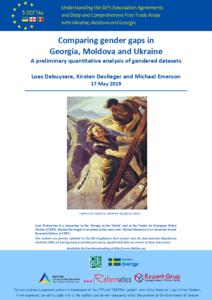
Comparing gender gaps in Georgia, Moldova and Ukraine. A preliminary quantitative analysis of gendered datasets
This paper investigates different types of gender gaps that exist in the perceptions and participation of Moldovan, Georgian and Ukrainian citizens in the political, social and economic realms. The aim of this preliminary study is to not only analyse gendered differences between the three East European countries that have made Association Agreements (AA) with the EU, but also to compare their performance with that of a comparator group of EU member states. The paper finds that while a number of significant gender gaps can be detected in the three AA case studies, these are in many cases not substantially different from the gender equality performance of EU countries.